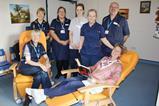Dementia sufferers see the best results when professional carers work in partnership with the patient’s family and friends. Restricted visiting makes that impossible, writes Julia Jones
“I don’t think I’ve ever been an Innovation before…” commented Joanna James, lead dementia nurse at Imperial College Healthcare Trust. I felt a little surprised myself. But there we were, first onto the platform at the Royal Society of Medicine’s 15th Innovations Summit last month. The RSM President Sir Simon Wessely did his best to sow dissension by referring to Jo as the only one with “a proper job” – my co-campaigner Nicci Gerrard and I are writers – but we shrugged this off with the sang froid of the Three Musketeers and watched the speaker’s clock on the lectern tick down our six minutes each as we, one for all and all for one, tried to convey what had been happening in John’s Campaign since November 2014 when Nicci and I decided that “up with this we could not put”.
Her family’s separation from their father-with-dementia (Dr John Gerrard) by traditional restricted visiting hours and a kneejerk “ban visitors” reaction to a norovirus outbreak, had been catastrophic. Nicci and I agreed that we would never have tolerated such separation from our children; therefore we should not tolerate it from our vulnerable elders. They, after all, in the aftermath of WW2 and new understandings of Attachment Theory, had campaigned for unrestricted access to us, if we, as children, were taken into hospital. Both Nicci and I knew people who had been involved in the Mother Care for Children in Hospital campaign during the 1950s and 1960s. We felt that this was payback time. So John’s Campaign for unrestricted access was born.
Unequivocal study results
Surely all of us now know that hospital is a frightening and disorientating experience to those who are not in their “perfect mind”, whether temporarily (delirium, post-op confusion, episodes of mental vulnerability) or permanently (dementias, learning disabilities). If not, we should look at the findings of the massive Stirling University Study (12,000 records analysed) that was published in August this year. They are unequivocal “People who are admitted to hospital with confusion seem to do badly, and are at an increased risk of dying, increased risk of re-admission, and a hospital stay nearly two weeks longer than those without confusion,” concludes Professor Emma Reynish. The scale of the problem is massive. “People with confusion – or cognitive spectrum disorders – make up over one third of the population over 65 who are admitted as an emergency to hospital, and half of patients over the age of 85 years.” I’m 63 – I see this coming.
There are too many occasions when a close relative arrives to visit only to find that there is no one who can take the responsibility of informing them
It’s not Rocket Science to suggest that those people should be supported and represented by those a little younger or a little more alert, who are going to pick up the care again when the hospital admission ends. Pax to all stressed-out consultants – you are wasting your expert time if you don’t talk to the family carer, daily if necessary. No, you don’t need to tell it 14 times to all second cousins three times removed, but once, yes – to someone other than to the patient who may not be fully able to understand your wise words. Restricted visiting makes this difficult (or impossible). Here’s a tweet posted while I was writing this article: “I’m on Ortho Trauma Ward, visiting is in the afternoon, ward round in the morning, most relatives don’t see Ortho Cons”.
There are too many occasions when a close relative arrives to visit – and naturally expects to get the picture of what is happening and what will need to be done – only to find that there is no one who can take the responsibility of informing them. And if acute trusts are slow to value family input, mental health trusts are… slower. As I prepared my report for the Royal Society of Medicine, I noticed that while there are now only 15 acute trusts in England that have no involvement at all in our campaign, there are only 15 mental health trusts that do. On the advice of Neil Churchill at NHS England Patient Experience, we’re about to run a workshop with Age UK to explore this.
Pioneering work
Meanwhile, back to the “innovatory” idea of welcoming someone intimately concerned with someone else’s well-being to support them when in hospital.
Jo may have felt uncomfortable with the idea, but she is a trailblazer. Not only were she and her colleagues the first to adopt John’s Campaign thoroughly, throughout all their hospitals, they have now reached the point where they don’t need us or the Carers Passports that Jo worked so hard to establish. She was able to tell the RSM audience that the approach has “gone corporate”. It is now considered completely “normal” that family carers and professional staff work in partnership when someone with dementia is admitted to hospital.
ALL trusts should reconsider their visiting policies and work in partnership with the people who are most closely concerned
Elsewhere in the UK, trusts (or health boards) have gone further. Betsi Cadwaladr University Health Board was the first in Wales to adopt the principles of John’s Campaign – beginning with a single nurse in a single ward at Ysbyty Gwynedd. In September this year they announced the end of all restricted visiting in all their hospitals, for everyone. NHS Grampian have been rolling out a policy of “person-centred visiting” (negotiated for individual needs) throughout all their hospitals and have recently completed this with the inclusion of the Royal Cornhill, their psychiatric hospital in Aberdeen.
As the NHS approaches its 70th birthday (and its danger of dementia increases!) ALL trusts should reconsider their visiting policies and work in partnership with the people who are most closely concerned. As one nurse announced jubilantly at our Scottish Conference in August, “the [visiting] bell is in the bin!”
Watch Julia, Nicci Gerrard, and Jo James speaking about this at the RSM Medical Innovations Summit in London last month:































No comments yet